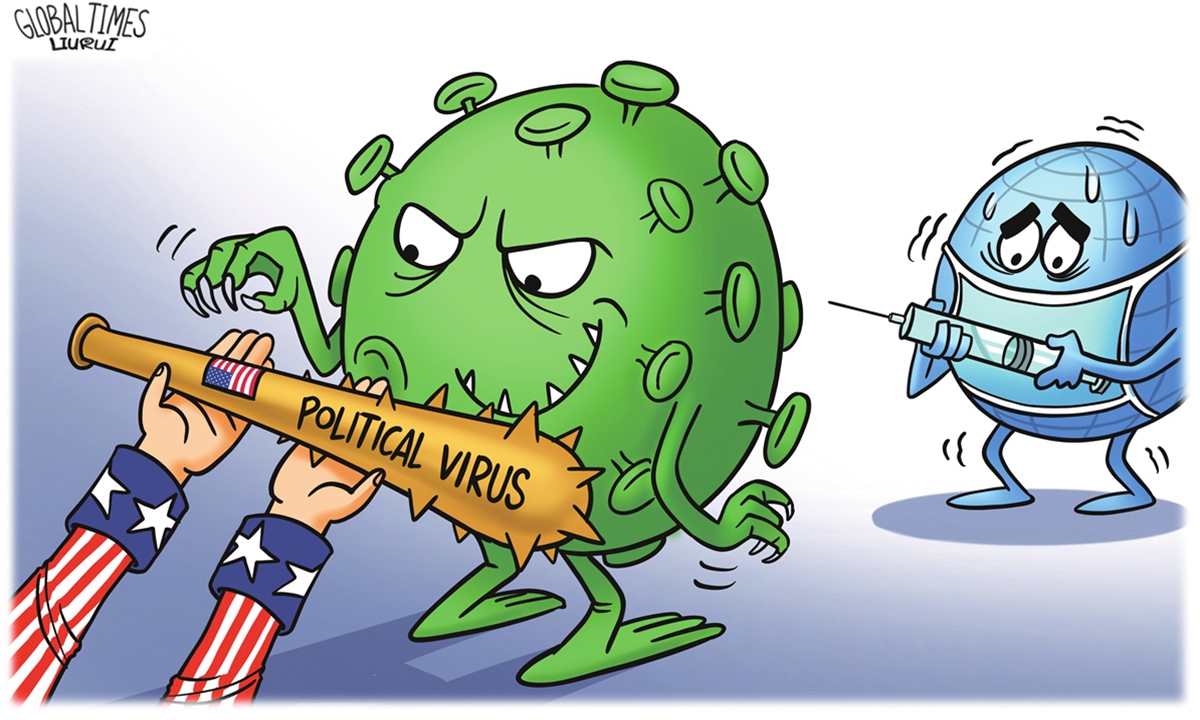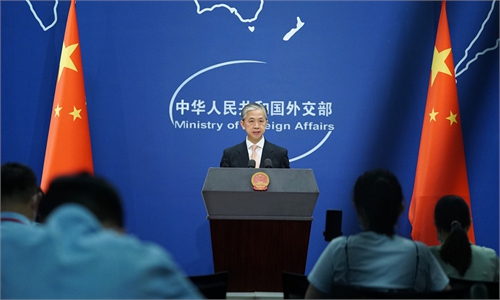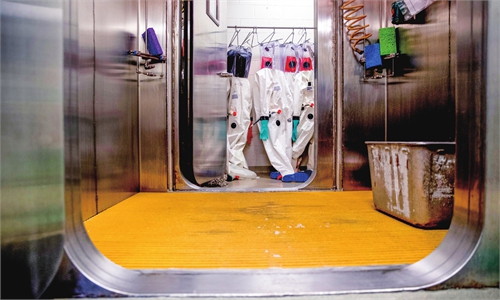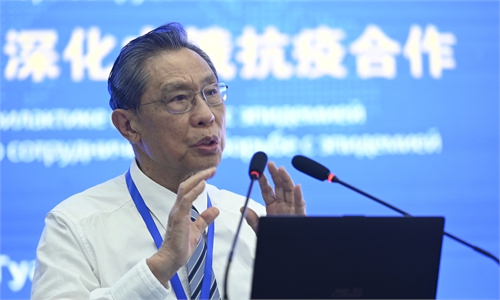WHO's SAGO a worthwhile attempt for virus origins tracing, but needs to be politics-free

Illustration: Liu Rui/GT
As the world is still suffering from the constantly mutating SARS-CoV-2 that has caused human being horrific casualties, the source-tracing study has yet to come out of the impasse where political manipulation has overridden scientific cooperation. The international community used to put great trust on the WHO, which is supposed to be a respected authority in handling public health emergencies, in the hope that it could navigate the world through the swamp of this trying pandemic. But realities have proven us all wrong, as the WHO report on source-tracing is not that well respected and has been challenged and distorted relentlessly to serve political purposes. Even the WHO itself comes under great pressure from its benefactors who want to have a say in this purely scientific matter. As a result, the authority has passed the buck to an independent expert team called SAGO, the Scientific Advisory Group for the Origins of Novel Pathogens.The expert team is thus bestowed the critical mission to "advise the WHO Secretariat on technical and scientific considerations regarding emerging and re-emerging pathogens," and of course, "to identify the source of the SARS-CoV-2 virus and the route of introduction to the human population" is by its nature a task of the time. Yet the world has seen more than its fair share of variants since the outbreak of the COVID-19 pandemic, whether it is the virus adapting to natural selection or the "professionals" bending to political will. So how can we be assured that this new group will be the final answer to the long-lasting pandemic, let alone a cure-all for all future crises? From what we have seen about its predecessors and their report, as long as the political maneuvering has not stopped, SAGO might as well be another predicament that is no better than the one we are already in.
The double-edged sword cuts both ways.
SAGO does have the potential to be the right choice for the source-tracing study. It is the one and only team in this field that unites leading scientists from all related disciplines across the world. No other could and is better suited than the WHO to put together such a fancy team to continue the source-tracing work. And ideally, the scientist group will "serve in their individual expert capacity and shall not represent any governments, any commercial industries or entities, any research, academic or civil society organizations, or any other bodies, entities, institutions or organizations." It seems that the experts chosen for the task would be impeccable and the study will come to reasonable conclusions. If things work out, the WHO will easily earn back the trust it longed for from the international community and prove its firm leadership. But that comes with some premises.
First and foremost, the WHO will have to make sure the composition of the team is just as how it is planned for, considering not only relevant technical expertise, but also different regions, especially the low and middle-income countries, and gender balance, as it stated in the "Call For Experts" for SAGO. But that is just the easy part. What is really tricky is to tell apart those candidates who are inherently biased. A lesson we have learned from past years' experience of dismissing all kinds of misinformation is that, not all scientists tell the truth and stick to their moral standards as they are expected to do; otherwise the "lab leak theory" wouldn't have caused such a sensation. And more importantly, if the group could not be guaranteed a pure-science mission, then it might cause more harm than good. The expectation has already been raised to a very high level, as if this group is our only shot for tracing the origins. This is not healthy for scientific study. We might find ourselves in a situation where people naturally believe whatever conclusions SAGO might come to, as this group represents the most professional figures in the industry. But once the group is rigged or misled, it would greatly harm the credibility of science, a disaster for both the WHO and the world. And any misleading conclusions from SAGO could result in serious consequences. Since the WHO decides to forge such a double-edged sword, it has to wield it carefully to avoid cutting itself.
It takes two to make a bargain.
Of course the WHO has the right to establish a special expert team without the consent of all its member states, and so it did with SAGO. But one thing it should bear in mind is that, the WHO alone could achieve little on such an international concern as source-tracing of SARS-CoV-2. Whether it likes it or not, it has to find a way to work with member states for a solution in this case, especially countries involved. The previous China-WHO joint research already set a good example of how cooperation could be managed and carried out, and the achievements of that research should be valued and respected by all for the source-tracing process to move on effectively and efficiently. Taking actions without the consent of member states will only hamper WHO's credibility and hinder scientific study.
Meanwhile, learning how to cooperate is equally important as the will to cooperate. It takes two to make a bargain, but three would make a quarrel. Whether SAGO could yield valuable results depends on how the WHO would cooperate with countries involved. Once it decides to conduct a joint research, it'd better show legitimate respect for the other party, and protect the cooperation from interference of third parties. Countries have conflicted interests, and if the WHO is wise enough as an independent organization it claims to be, it should know better than bringing in a third party to mess up the cooperation. The third parties' job stays at giving opinions. But decisions should be made up to those who are concerned. Being well aware that constantly echoing others will only wreck the deal, the WHO can and should be capable of choosing with whom and how to make a bargain.
Are we rearranging deck chairs on the Titanic?
With all that being mentioned about how to make sure SAGO would work properly, we cannot neglect the fact that the virus, with all its variant relatives, is still claiming people's lives at an astonishing speed, even right now when you read these lines. The pandemic is far from over, and we are still in the nightmare of over 4.8 million deaths, and the number is still climbing. Is it a little too early to dream of a world when we could rapidly detect emerging and re-emerging pathogens and take timely responses? Are we missing the point by putting too much attention on dating back how the pandemic started rather than figuring out where it is going? What is the use of rearranging deck chairs if we could not stop the ship from sinking?
The source-tracing study is extremely important, but according to the Eisenhower Principle, the important are never urgent. It is obvious that we have more urgent things to do - saving lives from the virus. Let's just check the to-do list we have in our hands: improving medical conditions in developing and least developed countries, ensuring equitable access to safe and effective vaccines, developing more effective treatments and so on. Any tiniest progress in the above-mentioned areas could save thousands of people's lives. Any distraction from the global effort of combating the pandemic is murder. Giving disproportionate attention to the source-tracing process at this time is not appropriate, which only caters to those who want to take advantage of the occasion to realize their political purposes. Whether it is to undermine their rivals or to shirk responsibilities of a fiasco in fighting the pandemic, it is immoral. The world shouldn't fall for it. The best we can do is to let scientists do their job, with no interference or push from the political world.
It is one thing to come up with an idea and another to make it come true. Though it is yet to see what the WHO will achieve with SAGO, discussions have already heated up around its legitimacy, operation and timing. The WHO and its member states should act carefully with this new mechanism and not let it become another sacrifice to political manipulation. All in all, even if SAGO has an unclear prospect of being a panacea for all future public health emergencies, it is a worthwhile attempt to break the deadlock in tracing the origins of SARS-CoV-2. Let's hope that this time, all countries could cast aside biases and let science take charge, so that we could avoid being stuck again in another predicament, pay more attention to the fight against the pandemic as well as saving more lives, and get through this dark time together as soon as possible.
The author is a current affairs commentator based in Beijing. opinion@globaltimes.com.cn



